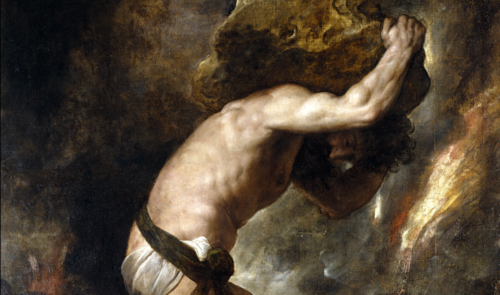
Two of my favorite biblical books are the Old Testament Book of Ecclesiastes and the New Testament Book of Revelation. Strange choices, I’ll admit. You’d be hard pressed to find two writers with a more profoundly different view of history, and humanity’s role to play in it.
Ecclesiastes basically views all of life as cyclical, repetitive, and ultimately futile – even boring! We humans are born, grow up, work, struggle, and die. We bring nothing into the world and taking nothing with us. All our efforts are just chasing after wind – building sand castles that are inevitably destroyed by the incoming tide of history. All of this has happened before, and all of this will happen again.
Revelation, on the other hand, envisions a cosmos that is on a collision course with an apocalyptic unveiling. God’s sovereign rule is breaking into history, and the end of the story is at hand. For Revelation, nothing about this life is remotely futile or boring. We are in a life-and-death struggle as the last chapter of human history is revealed. What could be more exciting or important?
Somehow, these two visions co-exist as integral parts of the Christian canon. Both are embraced by billions as authentic expressions of God’s story. Each one reveals something profound about our world and our Creator.
But can they both be true? How can history be both cyclical and linear? How can life be an endless cycle of birth and death, while at the same time heading towards culmination in a final revealing, release, and restoration?
I find this same confusing paradox in my own life. Much of the time, I feel as though I’m spinning my wheels. Despite my best efforts, very little changes – at least, not the way I expect. Yet, over time, life does develop and grow. The person I am today would both shock and amaze the young man I was in college. I have been transformed, almost to the point of being unrecognizable to those who knew me as a young person.
And yet, in many ways I am fundamentally the same individual I was fifteen years ago. My heart hasn’t changed. I’m still made of the same basic elements, even as life experience, circumstance, and personal choices have shaped me in so many ways – for better and for worse. My life has both a cyclical and a linear aspect. Some things never change, even as I grow and develop on a determined trajectory.
My heart has known this for a long time, even if my head is still catching up. I’m reminded of the writings of Albert Camus, who used the Myth of Sisyphus as a metaphor for the tragic/heroic state of human beings in the world. Sisyphus is condemned to push a huge boulder up a hill forever, always losing control just before reaching the peak. After watching the boulder tumble down to the bottom of the hill, Sisyphus walks down into the valley to do it all over again.
For the Greeks, who originally told this story, this was a vision of hell. The utter futility of Sisyphus’ actions – both heroically linear (with a goal of getting the boulder over the hill) and tragically cyclical (each time it rolled back down the slope) – combined to deliver a terrible punishment from the gods on an arrogant humanity.
For Camus, though, the myth of Sisyphus was a vision of human freedom. It is precisely in the midst of the incomprehensible cycle of history that we find fulfillment – not by successfully pushing the boulder over the summit, but through finding joy in the labor itself. Living in hope of a linear, “end-of-history” fulfillment, we are empowered to embrace the hills and valleys of the apparently futile cycles of Ecclesiastes.
I believe that this aspect of Camus’ philosophy captures something vital in the biblical tradition, strangely reconciling the quasi-nihilism of Ecclesiastes and the apparent triumphalism of Revelation. This philosophy is, in fact, the polar opposite of the totalitarian visions of the 20th century, in that it invites us to embrace life on its own terms, rather than as a means to a greater end. The gospel of Jesus is that we may have life, and have it abundantly. No more, no less.
This abundant life is not conditional. It does not depend on human progress, historical development, or an end-of-history event occurring in our lifetimes. It cannot be discouraged by suffering or loss or historical failure. No matter how many times the boulder rolls down the hill, there is life and power available to us to keep pushing, keep living, keep loving.
In times such as these, when the liberal illusion of “progress” has been so dramatically punctured, this is good news. On days like today, when I wonder whether my life “amounts to anything,” this is good news. The joy that sneaks up on me, and is always available to each one of us, will keep me moving back up the hill. Not out of fear, nor because I have no other choice, but because there is joy in the labor itself.